|
Going Foreign
Just before departing for Italy last month, I was irritated to be advised by an acquaintance that I must be delighted to be able to take five or six books with me ‘on a Kindle’ and thus save on the weight of my luggage. I was irritated partly because I am unsure what a Kindle is, but also the assumption that I would want to take a load of books with me, as my intention was to get away from the day job. On foreign trips I always take only one book, invariably by an author I trust, as there is little time to read given my ambition to discover all of Italy, one restaurant at a time.
This year, my travelling companion was the ironically titled Journey Into Fear by Eric Ambler, which I re-read, with great pleasure, for the first time in 52 years. Published in 1940 and set in that first year of the war (before Italy joined in) it is a suspenseful spy story tracking the journey by sea of a British engineer, the unwitting target of Nazi agents, from Istanbul to Genoa. Who on the boat can he trust, as all the other passengers are highly suspicious? Should he have any faith in the protection offered by Colonel Haki of the Turkish secret service (one of Ambler’s best creations, played by Orson Welles in the original film version)? What can he do when a known assassin joins the ship at a stop-over in Greece?
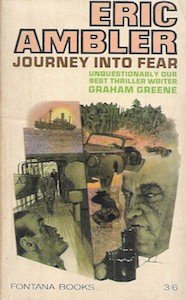
It is a wonderful thriller, showing Ambler’s skill at describing places and (shady) characters with great economy, as an ‘ordinary’ hero struggles to control his fear when he finds himself totally out of his comfort zone, alone and threatened by ruthless professionals. A masterclass.
Coincidentally on my return I learn that the bespoke London book dealer Peter Harrington is offering a 1939 American first edition of possibly Ambler’s most famous thriller, A Coffin For Dimitros, for a mere £1,750. Better known in this country as The Mask Of Dimitrios, ‘Coffin’ was actually Ambler’s original title for the book now rightly seen as a classic.
Whilst in Italy, I am always attracted to market stalls selling second-hand books, especially gialli – crime novels in their famous yellow jackets. Among the many titles in Italian translation I found that the works of James Hadley Chase (1906-1985) still seem remarkably popular.
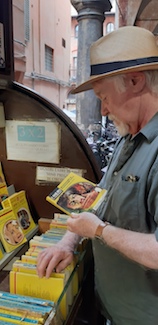
To get a slightly more modern take on crime fiction reading habits in Italy, I did of course visit several large bookshops in Bologna and Florence only to find them stacked to their frescoed ceilings with copies of Stephen King’s Fairy Tale and with not a Richard Osman in sight.
Beyond the Last Page
I once had breakfast with Michael Gilbert. We were staying in the same hotel at some crime writing conference or other and found ourselves sharing a table in the dining room one morning. I knew Michael Gilbert (1912-2006) as a popular and highly-regarded crime writer; he had no idea who I was – there was no reason he should – but he was charming and polite and we even co-operated on The Times crossword. (Well, I got one clue, he got the rest.)
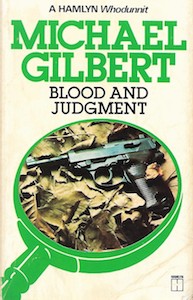
Recently I acquired Blood and Judgement, his 1959 police procedural which was, although I had not realised it, the first of his novels to feature Detective Sergeant Patrick Petrella, who was to become one of Gilbert’s best-known series heroes (he had several and also wrote many fine stand-alone crime novels, most with a strong legal theme).
Blood and Judgement is an excellent tale of a murder investigation in London clubland and around (and actually in) a hidden reservoir, but the edition I read (a 1980 Hamlyn paperback) also offered an added bonus. With any old paperback, I simply cannot resist turning to the back, not to discover whodunit, but beyond the text to the pages of advertisements for the other titles available from the publisher. There I often find books I had forgotten about or, much better, books I did not know about and could now hunt down.
Usually, the ‘other titles’ section is divided into easily recognisable categories: Crime, Suspense, Adventure, Historical, Romance, Western, War, Horror and so on. In this Hamlyn paperback I discovered a category I had never come across before: HORROR/OCCULT/NASTY.
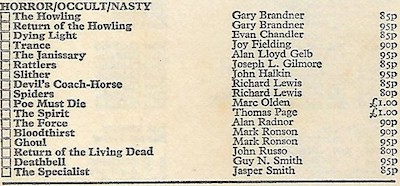
I cannot say I have read any of the titles listed by Hamlyn in 1980 in the NASTY category, although I did spot the name of one author I thought sounded familiar. However, I quickly discovered that the Mark Ronson listed there was not the man responsible for Uptown Funk, rather a pen-name used by Marc Elward Alexander (1929-2020). Born in Dorset, but taken to New Zealand as child, Alexander returned to England in 1956 to work as a journalist on Fleet Street and eventually pen some seventy books, both fiction and non-fiction. His greatest success was in the horror genre, as Mark Ronson, and his best seller was Plague Pit in 1981, when the other Mark Ronson would have been about five.
Friends in Low Places
Politicians clearly do not have enough on their plates these days and often find the time to co-operate with established authors and launch second careers as thriller writers. Possibly the most famous case of this diversification was when former US President Bill Clinton entered the fray with James Patterson as his co-author, closely followed by Hilary Clinton, tag-teaming with Louise Penny. Now I hear that Katrin Jakobsdottir, the Prime Minister of Iceland, is the co-author with Ragnor Jonasson of Reykjavik which will be published by Michael Joseph in August next year. There can now be few people in Iceland who have not written a crime novel.
I should also point out – because she is an old chumette and supplies me with bootlegged maple syrup – that best-selling Canadian author Louise Penny has a new ‘Three Pines’ novel out next month: A World of Curiosities, published by Hodder.
Radio Times
I am heartened to discover, as I am sure is my publisher, that a younger generation (and, face it, all generations are younger than me now) is taking an interest in crime novels and authors from the past, specifically Margery Allingham, and though I probably should not be surprised, I was when I found the source of enthusiasm was Australia.
In Sydney, two disgracefully young, but very erudite, young chaps, Felix Shannon and Benjamin Herder (known jointly as ‘Flex and Herds’) have a show on radio station 2ser called Death of the Reader where they forensically examine murder mysteries from the ‘Golden Age. In recent weeks they have discovered Margery Allingham, initially via her wartime thriller Traitor’s Purse and, having enjoyed it, have moved on to her last novel, Cargo of Eagles, which was completed by her husband after her untimely death in 1966.
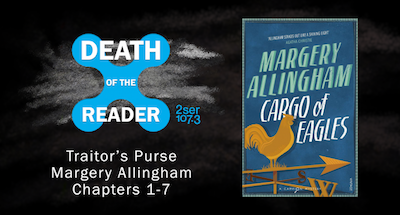
I was delighted to be asked to participate in the first of their programmes discussing Cargo last month and did manage to mention, purely in passing, that Mr Campion’s Mosaic was about to be published...
For Legal Reasons
There are many new crime novels I perhaps should have covered in this month’s column, and two I certainly intended to but for legal reasons...
One was David Hewson’s The Medici Murders [Severn House], which is set in Venice, a place I know David knows well as, just before my first visit to La Serenissima, he gave me a complete briefing on places to stay and things to do there. (The briefing took place in The Sussex Tavern in Covent Garden as I hazily recall.)
The other was A Heart Full of Headstones by Sir Ian Rankin [Orion]. This must be the first time in three decades that I was unaware that a new John Rebus novel was due.
Reissues of the Month
At a time when there is a ton of good new crime fiction around, it is worth noting that there are some very interesting re-issues appearing on both sides of the Atlantic.
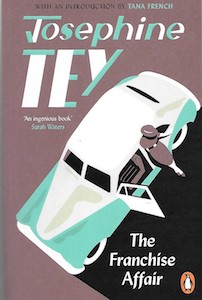 Here, thanks to Penguin, we have wonderful new editions in splendid art deco covers of the novels of Josephine Tey, beginning with The Franchise Affair from 1949, To Love and Be Wise (1950) and her most famous, The Daughter of Time (1951) which probably started the Richard III Is Innocent campaign. Here, thanks to Penguin, we have wonderful new editions in splendid art deco covers of the novels of Josephine Tey, beginning with The Franchise Affair from 1949, To Love and Be Wise (1950) and her most famous, The Daughter of Time (1951) which probably started the Richard III Is Innocent campaign.
If you’ve never heard of Josephine Tey and don’t get the reference to Richard III, then shame on you.
I can forgive you for not having come across the author Albert Sidney Fleishman (1920-2010), but thankfully those energetic fans of all-American pulp fiction at Black Gat Books have. Their latest revival is his 1955 adventure novel Blood Alley, which I fondly remember from the movie version, which was shown regularly on television in my youth, a stirring tale of a wayward American ship’s captain helping an entire village to defect from Red China to Hong Kong on a hijacked paddle-steamer down the Formosa Straits, or ‘Blood Alley’.
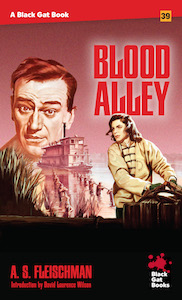
The film, made at the height of anti-communist feeling in the US, makes no bones that the evil Red Chinese are the bad guys here, although the book is far less dogmatic and is written as a novel of suspense not propaganda and clearly drawn from Fleischman’s experiences in the US navy during the war in China and the Far East.
The female lead was the delicious Lauren Bacall and, initially, Robert Mitchum was to play the ship’s captain but on the first day of shooting, Mitchum had an altercation with the film unit’s head driver and knocked him into the Sacramento River (standing in for the South China Sea). Mitchum was fired and instantly replaced by John Wayne.
In Memoriam
I find it hard to believe that it is ten years since the death of my good friend (and, until the introduction of email, pen-pal) Reginald Hill. We were colleagues in the famous Collins Crime Club, where our legendary editor Elizabeth Walter always insisted on using ‘Reginald’ rather then ‘Reg’ on the grounds that ‘one would never address Agatha Christie as Ag’.

We met at many a convention over the years and one of my first public appearances as a published author was in Manchester on a panel with Reg and Val McDermid and Val has contributed an intelligent and fond Introduction to the collection of Reg’s short stories now published as Dalziel and Pascoe Hunt the Christmas Serial Killer by HarperCollins.
Reg is best known for his mid-Yorkshire dynamic detective duo of Dalziel and Pascoe – one of the best crime series of the second half of the twentieth century – but he was prolific in other fields as well as short stories and anyone who has not yet come across the thrillers he wrote under the pseudonym Patrick Ruell is in for a treat.
On another poignant note, I have to record the death last month of the bookseller Ralph Spurrier, aged 74, after a long illness.
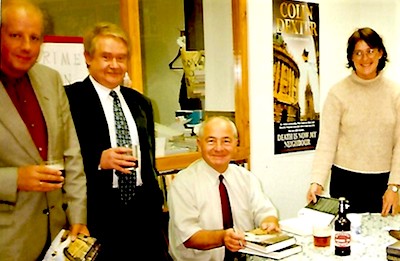
To call Ralph simply a bookseller is to do him an injustice as when it came to crime fiction, he was an enthusiast of the highest order and indeed launched himself as a crime-writer late in life. A reliable fixture at every crime fiction convention or festival for many years, Ralph always insured that an author’s books were there for sale.
In 1996, Colin Dexter was asked at the very last minute to sign copies of his latest Inspector Morse novel at a London venue. Ralph made sure there were plenty of books for Colin to sign and I (having, in those days, a proper job in the brewing industry) supplied the beer.
|
|
Books of the This Month, Last Month
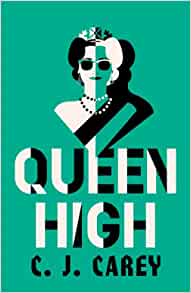
It is June 1955 and in C.J. Carey’s dystopian universe, the queen is expecting a state visit from US President Eisenhower. Dystopian? Yes, because the queen in question is Queen Wallis, the widow of King Edward VIII, and the country has in effect been a client kingdom of Nazi Germany since 1940 when the Battle of Britain never happened. Queen High [Quercus] is a fascinating novel of alternative history and a suspenseful story of how mainly female characters cope with the strictures placed on women by the ‘Grand Alliance’ (for which read Nazi) of the Anglo-Saxon Territories.
In the caste system imposed on women by the Alliance, the lead character, Rose Ransom, is in danger of slipping into the spinster category and being exiled to a ‘Widowland’ but before then has to combine her job as a censor of ‘degenerate’ (i.e. anything non-Nazi, especially Jane Austen) novels and poetry, in order to interview Queen Wallis to discover whether she is still towing the party line. To complicate matters, there’s a senior, but very dead, SS officer sitting on a bench in St James’ Park.
Queen High is a tour-de-force, gripping, devilishly imaginative and far too plausible for comfort.

I have never needed promotional gimmicks or ‘freebies’ to make me pick up a new Jack Reacher novel but I have to say I was delighted at the ingenuity of the items which accompanied my copy of No Plan B by Lee and Andrew Child and the marketing department at publisher Bantam must have had great fun putting them together
The enamel coffee mug, the folding toothbrush, the creamy coffee soap-on-a-rope and the miniature sample of O’Donnell’s Tough Nut ‘moonshine’ (a digestif I was previously unfamiliar with) all hint that the plot of the book has something to do with the American prison system and if anyone can break into a prison to right an injustice, it’s Jack Reacher. Could this be Reacher’s (a modern day Odysseus) journey into Hades as he continues to criss-cross heartland America by bus or hitching a ride?
I won’t spoil things, but the opening chapter does not feature Reacher, though the reader is left in no doubt that two of the characters, nursing bruises, have already met him.
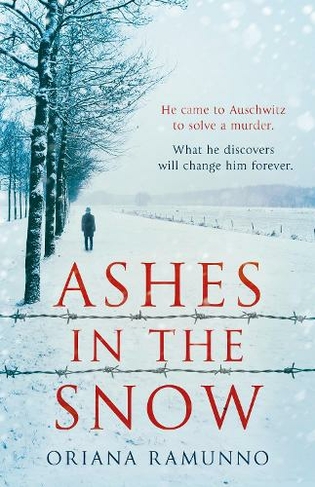
Where would a detective find a murderer in Auschwitz in the winter of 1943? The cynical answer, of course, is just about anywhere, especially when the victim is an SS doctor involved in horrific medical experiments and the nearest thing to an eyewitness is a young boy, a twin, who has been ‘selected’ by the notorious Dr Josef Mengele.
This is the set-up of Ashes In The Snow [Harper Collins] by Italian crime writer Oriana Ramunno, and she further complicates it by having her investigative detective a man with a medical condition of which the Nazis certainly would not approve, plus the dawning horrific realisation when he gets there of what is actually going on at Auschwitz.
Not surprisingly, the detective is changed by what he discovers and his behaviour becomes somewhat irrational – as it would, given the circumstances – but there is no doubting the power of the story and the righteous anger of its telling.
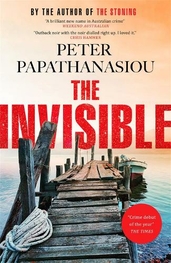
Peter Papathanasiou’s second crime novel The Invisible [MacLehose Press] takes his Australian police detective George Manolis back to his Greek heritage following a traumatic shooting while on duty. Add in a recent divorce and the death of his father, Manolis needs to get his head together and so goes back to his roots. It is probably not the best therapy given that he returns to an isolated, rather primitive, part of north-west Greece bordering Albania and Macedonia, which makes it ideal country for smugglers, illegal immigrants, family feuds and wild animals including bears, wolves and snakes – lots of snakes.
Being a cop, he cannot resist getting involved the disappearance of local character Lefty, an ‘invisible’ citizen in that he is undocumented and lives off the grid, though in this wild region around Lake Prespa, the ‘grid’ doesn’t really amount to much and no-one seems particularly concerned at his disappearance. During his exhaustive, and at times dangerous, search of the area, Manolis uncovers caches of weapons and cash, a village secret dating back to the Greek civil war and the tradition of the ‘sworn virgin’, but in truth the mystery plot is secondary to the richly described setting, a universe away from the Greece most package holidaymakers get to see.
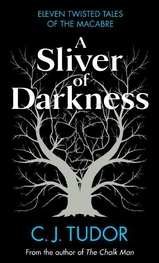
C.J. Tudor scares the hell out of me. Not her personally of course, but her fiction and A Sliver of Darkness, out this month from Michael Joseph, demonstrates her skill in the short form, with a collection of eleven chilling stories morphing from crime into apocalyptic science fiction. Fans of her novels, which have earned her the label ‘Britain’s female Stephen King’ (from the Daily Mail, so it must be true) have only until January to wait for a new one, The Drift, which is already giving me shivers which have nothing to do with the current restrictions on my central heating.
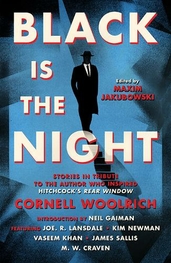
In Black Is the Night [Titan] editor Maxim Jakubowski has assembled a truly international cast of writers all producing new short stories in tribute to that master of dark (really dark) noir fiction, Cornell Woolrich. The American contributors include names you might expect, among them Joe R. Lansdale, James Grady, Chrles Ardai and James Sallis, but the inclusion of Brits, some not usually known for hardboiled noir fiction, may spring a few pleasant surprises.
Look out in particular for neat contributions from Vaseem Khan (even if more Chandler than Woolrich), a spooky piece (as to be expected) from A. K. Benedict, a very Woolrichian – if that’s a word – tragedy set in a Scottish amusement arcade by Donna Moore and a super tale of a tarantula of a trophy wife by Samantha Lee Howe. All worth the price of admission alone, whether or not you know anything about Cornell Woolrich – though of course, you should.
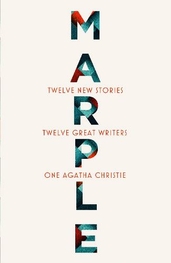
Still in anthology territory, but this time the focus is on a character rather than an author, Marple [HarperCollins] contains twelve new stories by twelve authors (all female) featuring Agatha Christie’s timeless detective Miss Marple. Some big names – in addition to Christie and Marple – are involved, among them Val McDermid, Lucy Foley, Elly Griffiths and Kate Mosse, so famous in fact that in the ‘About the Authors’ section, the words ‘bestselling’ and ‘bestseller’ feature at least eleven times.
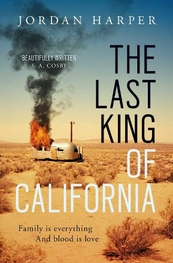
I found it difficult to like Jordan Harper’s The Last King of California [Simon & Schuster] partly because almost all the characters in it are pretty awful and partly because the style of the writing is overwrought, veering into blank verse at times and then comic book BANG/CRACK noises to describe violence.
It is basically the story of a young man who escapes from his family of petty criminals and their squalid life in the desert outside Los Angeles, goes to college, drops out and returns looking to be taken into the family ‘firm’. A less-likely candidate as a trainee gangster is hard to imagine as our ‘hero’ is weak, naïve – travelling by skateboard hardly intimidates – and permanently zonked on pills, dope or booze. His family’s criminal business faces competition from other local gangs with names like Aryan Steel, Nazi Dope Boys and the High Desert Blood Skins. No wonder the neighbourhood has gone to the dogs.
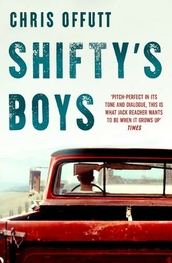
For a far superior slice of rural American noir, go no further than the Kentucky-set thrillers of Chris Offutt. Shifty’s Boys [No Exit] is a direct follow-on from last year’s excellent The Killing Hills and another case for Mick Hardin, a military policeman on home leave recuperating from a bomb attack on active service, and his sister, the local sheriff. When a local heroin dealer is found dead and no-one in officialdom seems interested, Mick becomes a reluctant private investigator working for the victim’s mother (a wonderful hillbilly matriarch) and an even more reluctant deputy for his sister who is busy seeking re-election by a less-than enthusiastic electorate.
When it comes to rural noir which can be savoured like the best Kentucky bourbon, Chris Offutt is the real deal.
A presto,
The Ripster.
|